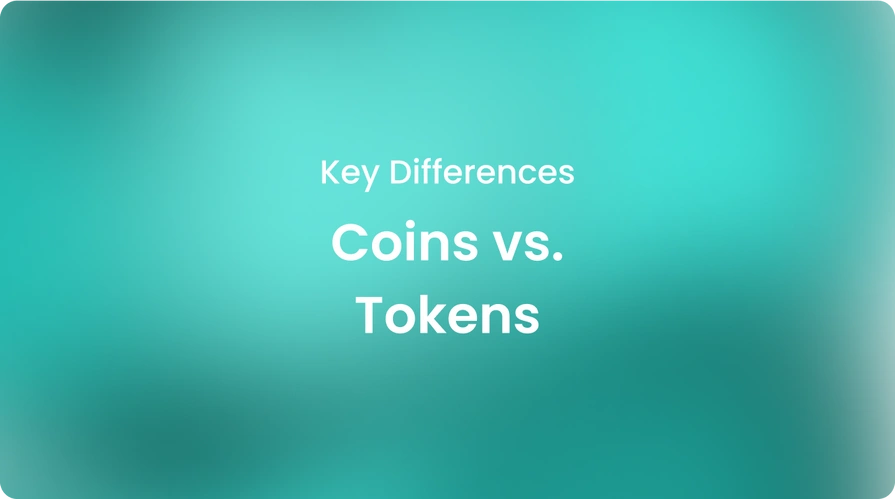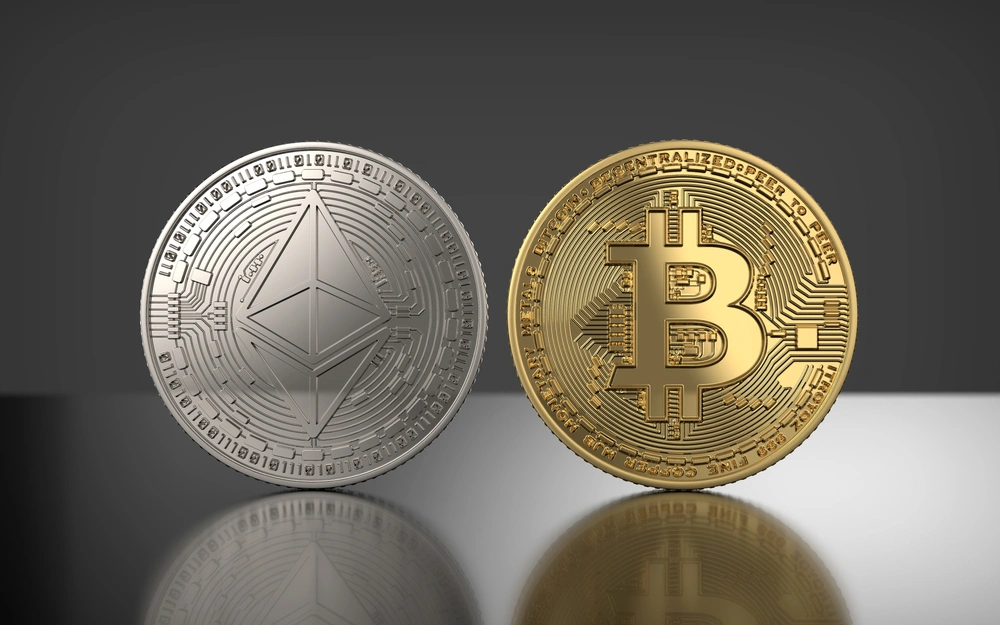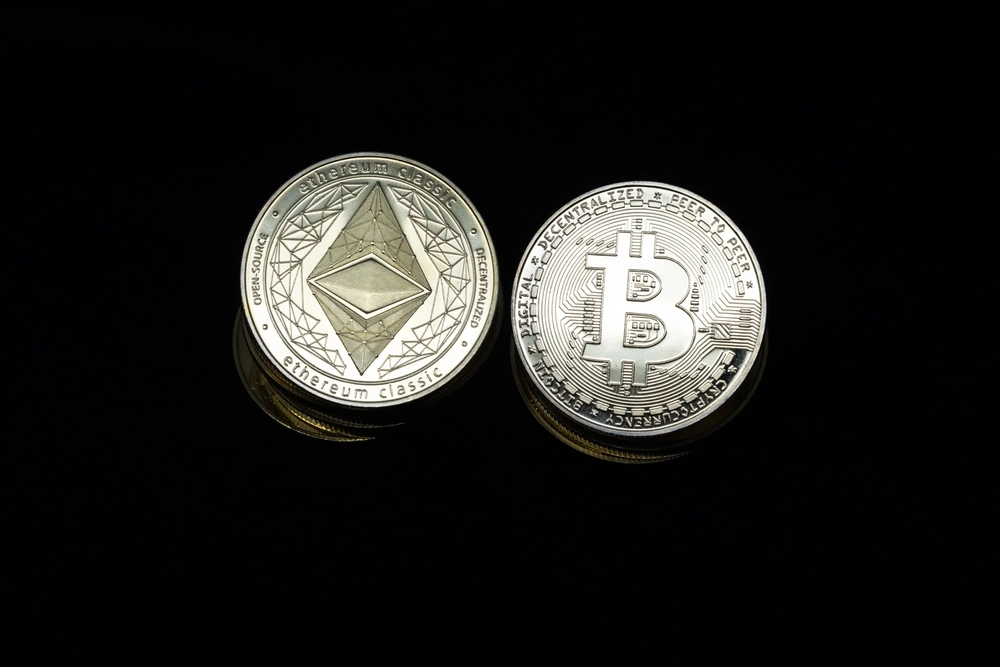|crypto, knowledgehub
Key Differences: Coins vs. Tokens

While cryptocurrencies have become quite popular over the past decade, there remains much confusion around common terminology and concepts, such as coins vs. tokens, in this evolving space.
This article aims to provide readers with an accessible breakdown of some key areas, including the distinctions between crypto coins and crypto tokens, their respective uses, and the most prominent examples of each.
By the end, you will gain a foundational understanding of these digital assets that can help inform future considerations of how they may integrate with their businesses or personal finances. Let's get started!
Crypto coins and tokens are often mistakenly used interchangeably, but they in fact refer to different things. To start, it helps to understand that crypto coins, such as Bitcoin, are native to their own blockchains; they literally serve as the "coin of the realm" for that specific network and its transactions.
Tokens, such as Ethereum, on the other hand, are created and deployed on existing blockchains as a way to power decentralized applications (dApps) and platforms.
So in a sense, while all coins are tokens in that they represent a share of ownership in their respective networks, not all tokens are coins, as many are built atop major chains like Ethereum rather than having their own dedicated infrastructure.
This nuanced but important distinction becomes clearer when exploring their respective uses. To better understand the distinction between them, let’s continue with the details of crypto coins and, later on, crypto tokens!
What are crypto coins?
Crypto coins facilitate digital transactions between peers without central authorities. Bitcoin was the first to utilize blockchain distributed ledger technology to allow for direct value transfers, completely eliminating transaction fees while maintaining high security.
Most function similarly, serving as digital cash that users can send and receive. Popular examples include Ethereum and EURK stablecoins.
While some aim to improve on scalability shortcomings, their fundamental purpose remains the same: to operate as decentralized, borderless currencies. There are also different types of cryptocurrencies, such as stablecoins, which aim to provide stable value against fluctuations.
What are crypto coins used for?
Beyond simple crypto payments, crypto coins increasingly provide access to various financial services as the industry matures. Users can take out loans using coins as collateral via decentralized finance (DeFi) and dApps.
They can also earn interest by "staking" coins to validate blockchain transactions, as is common with proof-of-stake networks. More experimental areas, like payment coins focused on remittances or digital collectibles, also leverage benefits of cryptocurrencies.
Overall, coins allow global cryptocurrency holders to store and exchange value, take advantage of novel DeFi services, and participate in an unfolding financial revolution.
What are the most popular crypto coins?
Bitcoin: As the first cryptocurrency, Bitcoin remains the most widely adopted and has the highest overall market capitalization, currently over $29,000 per coin. Its proven track record and brand recognition have made it an accessible onboarding point for many new users.
Ethereum: While also functioning as a currency, Ethereum is perhaps even more noteworthy as the platform enabling the rise of decentralized applications (dApps) through its robust smart contract functionality. It remains the most used blockchain for developing new tokens and protocols.
BNB Coin: Created by leading cryptocurrency exchange Binance, BNB powers discounted crypto trading fees and serves as the native currency for the exchange's growing ecosystem of financial services.
Cardano: This proof-of-stake coin is notable for its peer-reviewed research methodology and focus on scalability and sustainability. Staking rewards also draw significant participation as their platforms expand.
EURK: Secured and audited by CBQ, EURK is a euro stablecoin that is 1:1 pegged to the fiat currency euro. As a stablecoin available on ERC20, EURK provides security, transparency, liquidity, and stability.
What are crypto tokens?
While crypto coins function similarly to traditional money, crypto tokens generally serve as assets, with usage tied to crypto services or platforms in the crypto ecosystem.
The most straightforward example is ERC20 tokens, which are contract-based digital assets built and issued on the Ethereum network. But tokens also power utilities on other smart contract-compatible blockchains.
What are crypto tokens used for?
As applications of crypto coins and crypto tokens continue to expand, opportunities are emerging for businesses to leverage the most popular crypto coins, like Bitcoin, as well as the most popular crypto tokens, exemplified by Uniswap, Chainlink, and Axie Infinity.
The potential uses for blockchain-based tokens are diverse and still being discovered. Some of the most notable current applications include:
- Powering decentralized applications (dApps) with ERC20 tokens on Ethereum allows participation in decentralized finance platforms, games, marketplaces, and more.
- Representing app/platform ownership or revenue sharing. Tokens distribute value-creation rights to supporters through new cooperative models.
- Unlocking premium features and content Tokens can provide exclusive access, upgrades, or customization within an ecosystem.
- Enabling decentralized governance. Tokens tied to protocol governance ensure decentralized decision-making rights.
As the benefits of token-powered economies become clearer, this programmable method of distributing access, ownership, and rewards is poised to disrupt many traditional industries.
What are the most popular crypto tokens?
Uniswap: UNI tokens represent ownership in the leading decentralized exchange, rewarding liquidity providers.
Aave: The open-source liquidity marketplace issues AAVE and multi-collateral stablecoins hold billions in total value.
Chainlink: As the most used decentralized oracle network, LINK tokens secure real-world data integration vital for complex smart contracts.
Decentraland: MANA allows the purchase of virtual land within this user-owned virtual reality platform built on the Ethereum blockchain.
Axie Infinity: This popular blockchain game's AXS and SLP tokens have attracted millions as players can earn crypto through skill and trading digital pets and items.
As this list demonstrates, there are virtually no restrictions on the use of tokens, which can represent anything from money to collectibles, ownership rights, or access within brand-new cooperative economies. Their potential continues to drive enormous growth and disruption across many industries.
There are also many types of tokens, such as real estate tokenization, security tokens, gaming tokens, NFTs, cryptocurrency tokenization, RWA tokenization, and more. If you want to learn more about tokenization solutions and invest in tokenization, you can trust Cryptobunq.
CBQ is an expert and reliable one-stop shop crypto service provider that offers a wide range of crypto solutions, such as node as a service, custody and wallet, batch payments, exchange API, and more. If you want to take your business one step ahead with blockchain-powered services, choose CBQ!
What are the key differences between crypto coins and crypto tokens?
Now that we've explored what crypto coins and crypto tokens are, let's summarize their core distinctions:
- Coins operate on their own dedicated blockchain, while tokens are built on another network like Ethereum.
- Coins primarily serve as currency or stores of value, while tokens derive value from their parent project or use case.
- Coins aim to replace fiat money, whereas tokens are more focused on access, governance, and utility within their ecosystem.
- The majority of coins have no central purpose or organization, whereas startups and individual projects issue tokens.
- Project failure is more detrimental to a token's price due to its dependence on the venture succeeding. But network effects and adoption lend coins longer-term stability.
- Coins are general-purpose digital cash, while tokens represent the assets or services of a particular online project.
Which one is more beneficial for your business?
For businesses seeking cost-effective, global payment settlements or avenues for customer-initiated micropayments, popular cryptocurrencies processed through services like Cryptobunq may offer compelling options.
Well-established coins could integrate smoothly thanks to growing merchant acceptance rates. However, tokens could potentially provide even more tailored opportunities to reward consumer behavior or run promotional initiatives by leveraging their innate programmability.
Smart contracts open doors for customer loyalty systems, referral incentives, or innovative fundraising campaigns through presales.
By tapping their respective strengths—fungibility for coins vs. flexibility for tokens—savvy firms stand to gain new competitive edges. It’s worth exploring viable integrations on a case-by-case basis. Therefore, the choice whether coins vs. tokens is up to you and your business needs.
The bottom line: coins, tokens, and the distributed revolution.
Crypto coins and crypto tokens have distinct characteristics, but both present exciting possibilities for businesses to leverage blockchain technology. Coins act as decentralized money, transmitting value on public blockchains. Tokens represent a wide range of digital assets hosted on the infrastructure they provide.
With an understanding of the key differences, companies can make informed decisions about exploring opportunities in the evolving world of cryptocurrency.
As mentioned earlier, Cryptobunq offers crypto wallets, API access for crypto exchange, e-commerce payment solutions, batch payments, and many more. You can integrate with Cryptobunq and start using the benefits of crypto in your business today. Contact us and start to explore!













